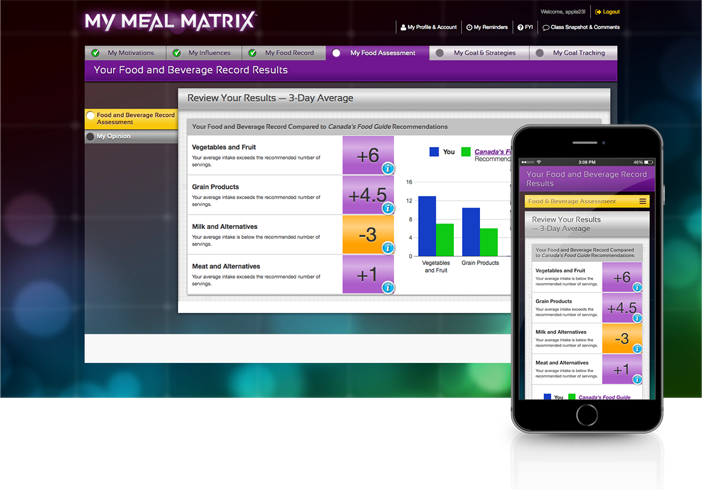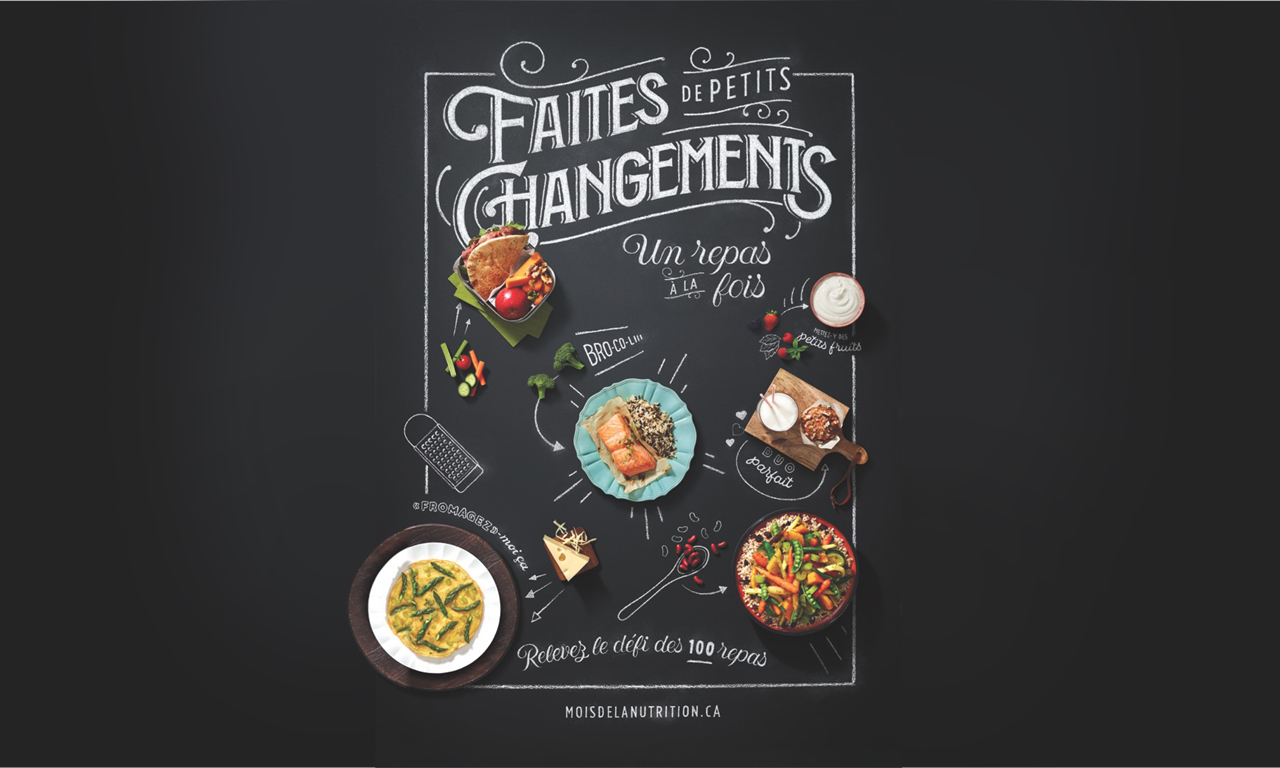
Nutrition
Dairy products have an
important role to play in a healthy diet
OUR TEAM OF DIETITIANS aim to enhance the health of Canadians by educating them on the uniquely valuable role of Canadian dairy products. They encourage Canadians to get enough milk products daily as part of a wholesome diet as well as foster trust in the place they hold within a healthy lifestyle. The team develops programs which target various groups such as health and education professionals as well as consumers.
Symposium on Nutrition and Health
Symposium on Nutrition and Health
DFC’s Annual Symposium on Nutrition and Health is a highly anticipated event in the dietitian community, so much so that each year, registrations start just minutes after the event is officially announced.
Dietitians once again came out in big numbers for the 15th edition of the Symposium, which was held successively in Edmonton, Toronto, Montreal, and Moncton in October 2015. This year’s gathering, entitled "Food Forever: Sowing the Seeds for Sustainable Diets", brought together top researchers and speakers to discuss the importance of producing foods within a context of sustainable development.
Two presentations illustrated dairy farmers’ active commitment to sustainable development and debunked the myths about milk production not being a sustainable undertaking. In each city, a local dairy farmer spoke about the responsible development practices implemented on his or her own farm. Results drawn from the evaluation forms show that participants truly appreciated this portion of the Symposium.
As is the case each year, the goal of the event aimed to give health professionals the opportunity to further their knowledge of nutrition, particularly regarding the value and the role of dairy products as an integral part of a healthy diet.
The 2015 edition drew 1,423 participants, primarily dietitians, 710 of whom attended the Symposium in person and 713 by webcast. Physicians, nurses, and physical activity and dental health professionals were also in attendance.
A well-thought out public relations campaign also helped generate media interest.
Overall, the campaign
Food Forever: Sowing the Seeds for Sustainable Diets generated
million media impressions
articles and mentions
The quality of the media coverage was very high, with a qualitative rating of:
93.67%Get Enough Campaign
The Get Enough campaign continues to encourage consumers to get the recommended servings of dairy products by informing them of their health benefits.
To do so, Get Enough features THREE MINI-CAMPAIGNS unfolded at targeted times throughout the year.
Each one highlights the link between a dairy product and its positive impact on certain diseases or conditions:
MILK AND COLORECTAL CANCER
YOGURT AND HYPERTENSION
CHEESE AND OSTEOPOROSIS
Since 2014, DFC have donated $402,000 dollars in support of these causes.
The Get Enough Helper app
All the campaign activities prompt consumers to visit the GetEnough.ca website and download the free Get Enough Helper app for smartphones. This tool helps Canadians track their daily servings for each food group. Since the launch of the app in April 2014, it has been downloaded more than 247,000 times!

Three mini-campaigns
In July and August 2015, the milk and colorectal cancer mini-campaign ran in Ontario, Quebec and the Maritimes. It included television ads, OOH advertising and a spectacular 60-second video (featuring acrobats) which was screened in theatres in the Maritimes. The video was also posted online.
In September and October 2015, cheese and osteoporosis took centre stage with television ads, a Canada-wide OOH campaign, print ads, a feature in the popular Chatelaine magazine, and participation in the National Women’s Show. The 2015 campaign reached, and in some cases exceeded, the objectives in terms of message delivery and appreciation, motivation, relevance and awareness.
Additionally, three media relations campaigns were implemented to support overall activities. The 2015 Get Enough media relations campaign generated 24.9 million media impressions and a total of 125 media stories, with a quality score of 72.4% and a cost per contact of $0.005.
The campaign resumed in March 2016 with a mini-campaign about milk in partnership with the Colorectal Cancer Association of Canada. Its unfolding features three new television ads and OOH ads throughout the country, online videos and an active presence on social media. In May, it was yogurt's time to shine with activities in partnership with the Heart and Stroke Foundation. Media relations activities are being implemented to support the campaign, and the results are still being evaluated.
A word from a partner
“The Heart and Stroke Foundation of Canada strives to tangibly improve the health of every Canadian family, every day. Together, with Dairy Farmers of Canada, we encourage Canadians to eat a healthy diet incorporating all food groups, including lower-fat dairy products. As the national Presenting Sponsor of Big Bike, DFC continues to inspire participants to lead healthy, active lifestyles. We are proud to partner with DFC on innovative projects like the Get Enough Helper app, our work on hypertension education and the Quebec Walk and Run for Heart. We are grateful for DFC’s passion and shared commitment to the health of all Canadians. Their generous support allows us to pursue our important mission of working to prevent disease, save lives and promote recovery from heart disease and stroke.”
David W. Sculthorpe
Chief Executive Officer, Heart and Stroke Foundation of Canada
Nutrition Month
In March 2016, DFC’s team of registered dietitians once again joined forces with Dietitians of Canada and the Ordre professionnel des diététistes du Québec to sponsor Nutrition Month.
This partnership enables DFC to publicly associate itself with the cause of nutrition as well as promote dairy products as part of a balanced diet.
This year’s campaign, with the slogan "Take a 100 meal journey: make small changes, one meal at a time", sought to encourage Canadians to improve their diets by gradually making small, realistic changes. The 100-meal journey spanned one full month, the ideal amount of time needed to adopt new and lasting eating habits.
The poster created to promote Nutrition Month was the result of a collaborative effort between DFC’s registered dietitians and those of the BC Dairy Association, Alberta Milk, SaskMilk and Dairy Farmers of Manitoba. It was distributed across the country in high schools and among health professionals. In addition, educational factsheets were created for adults and teenagers, and health professionals and teachers could download them free of charge at dairynutrition.ca.
Nutrition Month was also showcased on the dairygoodness.ca website with inspiring articles, nutritious recipes and practical tips designed by the registered dietitians at DFC and from various provinces.
A visual which creates quite a stir!
The poster was a big hit this year! The Ordre professionnel des diététistes du Québec and the BC Dairy Association even ran out and had to order more! In fact, the preliminary results from a survey conducted by D`FC show that more than 90% of respondents liked the poster and 70% of them visited the section of the website dedicated to the campaign.
Cuisinonsen famille
This April, the team of registered dietitians at DFC launched the Cuisinons en famille initiative (in French only, in Quebec only) as a follow-up to the Les mains dans les plats campaign (in French only), which ran in 2015. Last year’s campaign was primarily aimed at raising awareness among parents about the importance of passing down cooking skills to their children, whereas this year’s campaign focuses on the next step by providing parents with concrete tools to do so.
Cuisinons en famille centres on a user-friendly website, cuisinonsenfamille.ca, which is full of realistic advice, practical tips and recipes that are easy to make with kids. The site also includes a video section featuring the 12 episodes of the popular web series Les mains dans les plats, which was released in 2015 on recettes.qc.ca, coupdepouce.com and dairygoodness.ca. Each of the 12 episodes stars a parent-child duo making an everyday recipe that perfectly illustrates the benefits of cooking together as a family.
Indeed, preparing meals with children is a good way to pass down lifelong cooking skills, to foster a healthy diet and to spend some quality time together. The goal of the Cuisinons en famille campaign is also to encourage parents to cook with their kids using staple foods such as dairy products and fruits and vegetables.
The Quebec Produce Marketing Association also contributed to the campaign by putting its logo, which directs users to ilove5to10.ca, on the website and providing visibility for DFC on its social networks. In addition, a public relations campaign was launched to generate media and public interest in the website. Targeted journalists and bloggers received media kits that included aprons—one for an adult and one for a child—a chef’s hat for a child, a cutting board, recipe cards and the main ingredients needed to make them.
OntarioMy Meal Matrix
It’s a well-known fact that the majority of teenagers do not consume the recommended servings of Milk and Alternatives as outlined in Canada’s Food Guide.
To help address this concern, DFC’s dietitians in Ontario launched a one-of-a-kind program in September called My Meal Matrix. It’s a web-based interactive tool designed to motivate high school students to reflect on and improve their eating habits.
Students use the online tool at mymealmatrix.ca to record their food intake, assess their personal eating habits based on Canada’s Food Guide recommendations and set and track a relevant goal to improve their eating habits. The tool also helps them identify specific influences on their eating and beverage choices.

The online tool is also mobile-friendly and students can download a free app to record their food intake, track their goal, and receive text or email reminders. Teachers are able to view their progress through the My Meal Matrix website and provide comments to students using the Class Snapshot special feature.
The tool also includes a peer-to-peer feature that allows classmates to compare their results (anonymously). It’s a great way to raise awareness of teen eating habits and allow students to offer advice and encouragement to their peers. Feedback from students shows that they really love this feature and that it helps support their progress.
The program was promoted to physical education and family studies teachers in Ontario high schools via direct mail, engaging advertising in teacher magazines and workshops at teacher conferences. In addition, the data collected (anonymously) by means of the program will provide DFC with a wealth of information on the impact of the tool. This data will also shed light on teen eating habits in general, which will be very useful for the development of future nutrition education resources.
To date, almost 500 classes have been registered by Ontario teachers, with almost 5,200 student registrants.
classes
registrants
Maritimes EDUCATIONAL Videos
DFC’s team of registered dietitians in the Maritimes created a new video series entitled Learning about Canada’s Food Guide.
The videos, designed for grades 1 to 9 teachers in the region, were launched in January on the teachnutrition.ca website.
Accessible online at all times in French and English, the videos aim to help teachers convey the basics of a healthy diet that includes the recommended servings of Milk and Alternatives.
9Videos
-
1
VIDEO ABOUT CANADA'S FOOD GUIDE
-
4
videos about the food groups
(for grades 1 to 9)
-
4
videos about the nutrients found in each food group
(for grades 5 to 9)
THE VIDEOS CAN BE ACCESSED THROUGH THE ABC'S OF NUTRITION, AN extremely popular section of the website that receives on average 40% of the total monthly visits.
Downloadable activity sheets go along with the videos to help make the lessons more exciting. Teachers can choose from some forty activity sheets, which are grouped by grade level. The concepts respect the current curriculum in the Maritimes. The DFC-Health Canada collaboration has been very positive as the latter has granted DFC permission to use Canada's Food Guide after reading the videos' scripts.
Teachers were informed about the program through ads in trade magazines and web banners. The team of registered dietitians will also promote the videos at teacher conferences.




